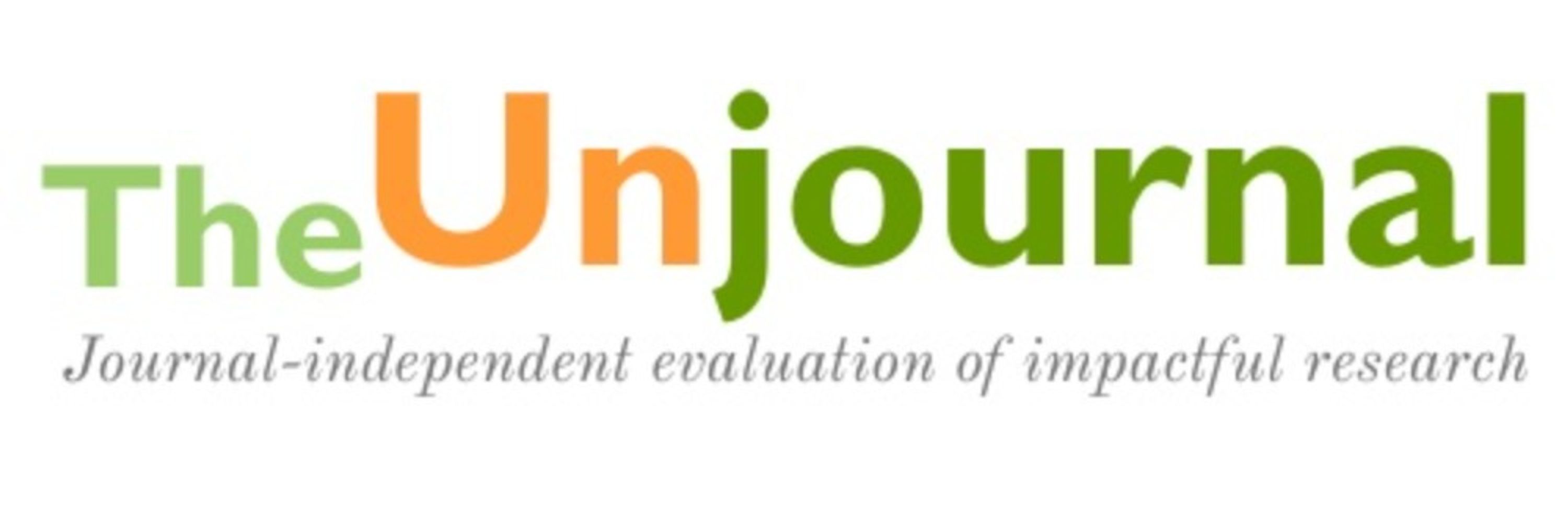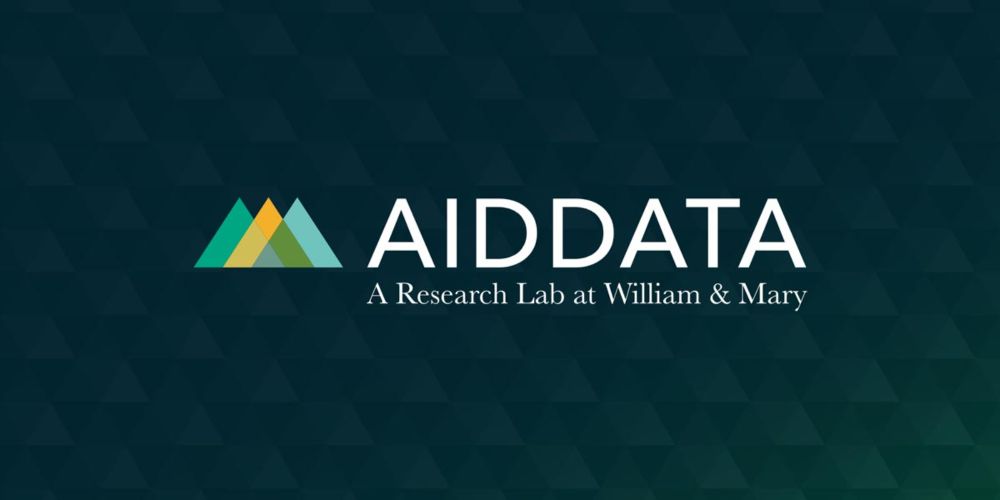
The Unjournal (Unjournal.org)
@unjournal.bsky.social
Researchers, practitioners, & open science advocates building a better system for research evaluation. Nonprofit. We commission public evaluation & rating of hosted work. To make rigorous research more impactful, & impactful research more rigorous.
See them all here: unjournal.pubpub.org/dash/collect...

Overview · Prize-winning & commended evaluations
unjournal.pubpub.org
November 7, 2025 at 3:12 PM
See them all here: unjournal.pubpub.org/dash/collect...
@davidmanheim.alter.org.il & Seinkmane
on "Forecasts estimate limited cultured meat production through 2050"
Anon. evaluators on "Asymmetry in Civic Information: An Experiment on Tax Participation among Informal Firms in Togo" and
"Misperceptions and Demand for Democracy under Authoritarianism"
on "Forecasts estimate limited cultured meat production through 2050"
Anon. evaluators on "Asymmetry in Civic Information: An Experiment on Tax Participation among Informal Firms in Togo" and
"Misperceptions and Demand for Democracy under Authoritarianism"
November 7, 2025 at 3:12 PM
@davidmanheim.alter.org.il & Seinkmane
on "Forecasts estimate limited cultured meat production through 2050"
Anon. evaluators on "Asymmetry in Civic Information: An Experiment on Tax Participation among Informal Firms in Togo" and
"Misperceptions and Demand for Democracy under Authoritarianism"
on "Forecasts estimate limited cultured meat production through 2050"
Anon. evaluators on "Asymmetry in Civic Information: An Experiment on Tax Participation among Informal Firms in Togo" and
"Misperceptions and Demand for Democracy under Authoritarianism"
@davidreiley.bsky.social
on "Does online fundraising increase charitable giving? A nationwide field experiment on Facebook"
@hughjonesd.bsky.social: "Ends versus Means: Kantians, Utilitarians, and Moral Decisions"
on "Does online fundraising increase charitable giving? A nationwide field experiment on Facebook"
@hughjonesd.bsky.social: "Ends versus Means: Kantians, Utilitarians, and Moral Decisions"
November 7, 2025 at 3:12 PM
@davidreiley.bsky.social
on "Does online fundraising increase charitable giving? A nationwide field experiment on Facebook"
@hughjonesd.bsky.social: "Ends versus Means: Kantians, Utilitarians, and Moral Decisions"
on "Does online fundraising increase charitable giving? A nationwide field experiment on Facebook"
@hughjonesd.bsky.social: "Ends versus Means: Kantians, Utilitarians, and Moral Decisions"
We should follow up on this -- there has been a lot on our plate.
November 5, 2025 at 11:21 PM
We should follow up on this -- there has been a lot on our plate.
@iabubakkari.bsky.social @lauramurrayphd.bsky.social @mahreenmahmud.bsky.social also cited 3+ papers evaluated at Unjournal.org (as well as many people wihtout Bluesky accounts)

Unjournal | Transparent Evaluation of Impactful Research
The Unjournal enables open, expert evaluation of economics and social science research, without the constraints of traditional journals. Discover how we make rigorous research more transparent.
Unjournal.org
October 22, 2025 at 9:19 PM
@iabubakkari.bsky.social @lauramurrayphd.bsky.social @mahreenmahmud.bsky.social also cited 3+ papers evaluated at Unjournal.org (as well as many people wihtout Bluesky accounts)
@berkozler12.bsky.social @johanneshaushofer.com @mushfiq-econ.bsky.social @deankarlan.bsky.social @davidmanheim.alter.org.il @chrisblattman.bsky.social @margaretsheridan.bsky.social @nathanbarker.bsky.social @johnlist.bsky.social
All cited 3+ paper evaluated at unjournal.pubpub.org
All cited 3+ paper evaluated at unjournal.pubpub.org

The Unjournal
The Unjournal PubPub community: journal-independent evaluation of impactful work in economics, policy, and social science
unjournal.pubpub.org
October 22, 2025 at 9:19 PM
And you can *cite* each Unjournal evaluation and response. Here's how, and why: youtu.be/iukYQNjWuG0

How and why to cite The Unjournal's evaluations in your research and practice
YouTube video by The Unjournal
youtu.be
October 22, 2025 at 7:20 PM
And you can *cite* each Unjournal evaluation and response. Here's how, and why: youtu.be/iukYQNjWuG0
The whole process is a waste of resources and diverts effort from improving research to journal shopping. Just give the paper a public rating, don’t “reject or accept”. That’s what we do at Unjournal.org.

Unjournal | Transparent Evaluation of Impactful Research
The Unjournal enables open, expert evaluation of economics and social science research, without the constraints of traditional journals. Discover how we make rigorous research more transparent.
Unjournal.org
October 11, 2025 at 6:42 PM
The whole process is a waste of resources and diverts effort from improving research to journal shopping. Just give the paper a public rating, don’t “reject or accept”. That’s what we do at Unjournal.org.
#development #ClimateAdaptation #agricultureRetry
This paper was suggested to us by www.aiddata.org/ (by 1 author) as being among their highest-value work meriting further evaluation. (Thanks!)
See our ‘evaluating research from impact-oriented organizations’ initiative -- bit.ly/4oahxEc.
This paper was suggested to us by www.aiddata.org/ (by 1 author) as being among their highest-value work meriting further evaluation. (Thanks!)
See our ‘evaluating research from impact-oriented organizations’ initiative -- bit.ly/4oahxEc.

AidData — A Research Lab at William & Mary
We equip policymakers and practitioners with better evidence to improve how sustainable development investments are targeted, monitored, and evaluated. We use rigorous methods, cutting-edge tools, an...
www.aiddata.org
October 8, 2025 at 9:42 PM
#development #ClimateAdaptation #agricultureRetry
This paper was suggested to us by www.aiddata.org/ (by 1 author) as being among their highest-value work meriting further evaluation. (Thanks!)
See our ‘evaluating research from impact-oriented organizations’ initiative -- bit.ly/4oahxEc.
This paper was suggested to us by www.aiddata.org/ (by 1 author) as being among their highest-value work meriting further evaluation. (Thanks!)
See our ‘evaluating research from impact-oriented organizations’ initiative -- bit.ly/4oahxEc.
Eva, managers also flagged identification concerns:
- Potential migration/sorting bias (healthier people moving TO irrigated areas?)
- Program timing may be endogenous (placed where conflict already decreasing?)
- Pre-trends need tighter verification (evidence of boundedly small differences)
- Potential migration/sorting bias (healthier people moving TO irrigated areas?)
- Program timing may be endogenous (placed where conflict already decreasing?)
- Pre-trends need tighter verification (evidence of boundedly small differences)
October 8, 2025 at 9:42 PM
Eva, managers also flagged identification concerns:
- Potential migration/sorting bias (healthier people moving TO irrigated areas?)
- Program timing may be endogenous (placed where conflict already decreasing?)
- Pre-trends need tighter verification (evidence of boundedly small differences)
- Potential migration/sorting bias (healthier people moving TO irrigated areas?)
- Program timing may be endogenous (placed where conflict already decreasing?)
- Pre-trends need tighter verification (evidence of boundedly small differences)
E1's suggestions:
- Update to modern TWFE methodology
- Quantify output effects "in an area with a larger buffer around the irrigation system"
- Additional robustness checks
- Update to modern TWFE methodology
- Quantify output effects "in an area with a larger buffer around the irrigation system"
- Additional robustness checks
October 8, 2025 at 9:42 PM
E1's suggestions:
- Update to modern TWFE methodology
- Quantify output effects "in an area with a larger buffer around the irrigation system"
- Additional robustness checks
- Update to modern TWFE methodology
- Quantify output effects "in an area with a larger buffer around the irrigation system"
- Additional robustness checks
Key concerns from E2:
"Need more context-specific information on the causal pathway" for better investment & program design
Measurement issues: surveys used _recall_ on caloric intake rather than standard nutrition indicators
"Need more context-specific information on the causal pathway" for better investment & program design
Measurement issues: surveys used _recall_ on caloric intake rather than standard nutrition indicators
October 8, 2025 at 9:42 PM
Key concerns from E2:
"Need more context-specific information on the causal pathway" for better investment & program design
Measurement issues: surveys used _recall_ on caloric intake rather than standard nutrition indicators
"Need more context-specific information on the causal pathway" for better investment & program design
Measurement issues: surveys used _recall_ on caloric intake rather than standard nutrition indicators
Evaluators liked the:
- Novel combination of spatial + survey data
- Basic empirical patterns (output & nutrition) considered sound
- Important policy question
- Novel combination of spatial + survey data
- Basic empirical patterns (output & nutrition) considered sound
- Important policy question
October 8, 2025 at 9:42 PM
Evaluators liked the:
- Novel combination of spatial + survey data
- Basic empirical patterns (output & nutrition) considered sound
- Important policy question
- Novel combination of spatial + survey data
- Basic empirical patterns (output & nutrition) considered sound
- Important policy question
The evaluations were split:
E1: 75/100 - Strong confidence in agricultural output increases, appreciated the methodology
E2: 46/100 - Found nutrition results "credible" but had substantial doubts about causal interpretation
E1: 75/100 - Strong confidence in agricultural output increases, appreciated the methodology
E2: 46/100 - Found nutrition results "credible" but had substantial doubts about causal interpretation
October 8, 2025 at 9:42 PM
The evaluations were split:
E1: 75/100 - Strong confidence in agricultural output increases, appreciated the methodology
E2: 46/100 - Found nutrition results "credible" but had substantial doubts about causal interpretation
E1: 75/100 - Strong confidence in agricultural output increases, appreciated the methodology
E2: 46/100 - Found nutrition results "credible" but had substantial doubts about causal interpretation
@scipost.bsky.social congratulations on your progress & thanks for all you do.
October 3, 2025 at 6:54 PM
@scipost.bsky.social congratulations on your progress & thanks for all you do.

